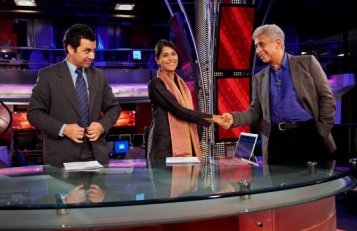I watched Anusha Rizvi’s Peepli Live over the weekend, and I must confess I walked into the theatre significantly deafened by hype. I’m on sabbatical from the reviewing game, and while it is wonderful to watch only what you want to, it is rather difficult to watch something that released two weeks ago without already having had strong opinions thrown at you. The shoe is on the other foot, and all I can say is that sometimes I wish it weren’t.
Anyway, Rizvi’s debut film is reasonably well-crafted and boasts of almost entirely terrific performances, but I was taken aback by its staggering lack of originality. And smarts. The film offers a single-minded, ruthless look at our news channels going all out to cover the story of a middle-India farmer about to commit suicide. Where this fellow differs from the hundreds of anonymous farmer suicides, though, is in making his deathly intent clear to the media ahead of the self plug-pulling, making him, as a TRP-totting news anchor says, ‘the first live suicider.’
Peepli Live is nicely detailed and, as mentioned, very competently acted, but that isn’t enough to masquerade the fatal facts: that it is a suicide film where you really don’t care much about the protagonist, and one which offers you absolutely nothing that spending half an hour surfing news channels during the Ash-Abhishek wedding wouldn’t already have shown you. Sure, it’s very watchable, for the most part — but is that benchmark enough?
 Rizvi, a veteran NDTV journalist, is more than qualified to give us something incisive, showing the real skullduggery behind the news instead of just making sure the OB vans look realistic. Unfortunately, this film strings together cliché after overused cliché — from news channel heads going on about how ‘it’s all about TRPs’; to an anchor modelled on (who else) Barkha Dutt/Sagarika Ghose, squealing about inexplicably in English even when her subject is only, firmly spouting middle-India Hindi; to sensationalist Hindi reporters tossing about the word ‘sansani’ at every given opportunity. Populated exclusively by stereotypes bled dry by Hindi films over the last 3-4 years, the film benefits from a strong cast fleshing out even these characters. It’s all painfully predictable, but flavoured with authenticity, the film nurses severely lofty pretensions, a bit of a stretch for a movie tickling audiences via rural-ised profanity instead of genuine wit.
Rizvi, a veteran NDTV journalist, is more than qualified to give us something incisive, showing the real skullduggery behind the news instead of just making sure the OB vans look realistic. Unfortunately, this film strings together cliché after overused cliché — from news channel heads going on about how ‘it’s all about TRPs’; to an anchor modelled on (who else) Barkha Dutt/Sagarika Ghose, squealing about inexplicably in English even when her subject is only, firmly spouting middle-India Hindi; to sensationalist Hindi reporters tossing about the word ‘sansani’ at every given opportunity. Populated exclusively by stereotypes bled dry by Hindi films over the last 3-4 years, the film benefits from a strong cast fleshing out even these characters. It’s all painfully predictable, but flavoured with authenticity, the film nurses severely lofty pretensions, a bit of a stretch for a movie tickling audiences via rural-ised profanity instead of genuine wit.
Ram Gopal Varma, that once-nuanced filmmaker now dealing exclusively in broad-strokes, told a relatively similar story of news sharks fighting over story scraps and even concocting them with his much-maligned Rann, and the only true difference between that plotless film and this one is detailing. God may or may not be in the details, but producer Aamir Khan is canny enough to understand that the appearance of subtlety is enough to let him get away with branding his film — one that merely calls a spade a spade, even after we’re all aware of its, um, spadiness — a satire, when it’s really just reportage, and mostly bland. But it looks nice and earthy, and that’s all that seems to matter.
News channels have always been a fascinating subject for cinema, but only when filmmakers dare to provoke, to incite, to compel. Sidney Lumet’s 1976 masterpiece Network starts off with a retiring television journalist announcing he would blow his brains out over the air next week, and, following a media furore, shows us his television network taking advantage of the hype and turning him into an icon, even as the channel seeks out terrorists for a lethal reality show. Barry Levinson’s far lighter Wag The Dog showed American spin doctors conjure up a phony war just to keep a political sex scandal off the headlines. The former a serious drama exaggerated for impact, today seeming eerily prophetic; the latter a loony, inventively-imagined satire, with some basis in fact.
Peepli Live, criminally compared by some to Kundan Shah’s Jaane Bhi Do Yaaron, doesn’t go down either route, but merely, faithfully, shows us what we already know.
Is that enough? Perhaps not, but then maybe just holding up a looking-glass successfully is a first, fledgling step in eventually being able to wield a big, magnifying one and actually seeing, and saying, something. We can only hope.
~
First published Mumbai Mirror, August 25, 2010
Leave a comment